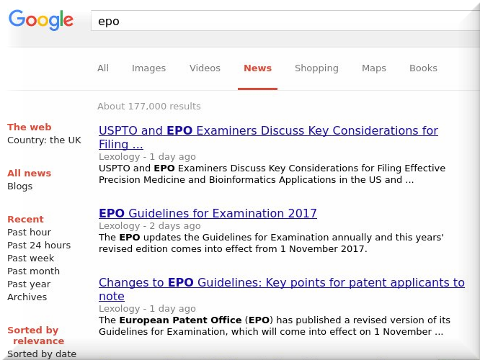

LAST month we wrote about Switzerland in relation to Patent Boxes (means for dodging tax). Yesterday, Philipp Groz and Teresa Rudolph from Schellenberg Wittmer wrote two 'articles' about patents in Switzerland, noting that "[c]omputer programs as such are not patentable." (the term "as such" became infamous within the EPO and caused great controversy)
To what extent can inventions covering software be patented?
Computer programs as such are not patentable. However, computer-implemented inventions are patentable (eg, inventions involving the use of a computer, computer network or other programmable apparatus, where one or more features are realised by means of a computer program).
To what extent can inventions covering business methods be patented?
Business methods as such are not patentable. However, business methods may be patentable if they are combined with technical features.
In T 0488/16, the board reiterated that it is not essential that the application contains experimental data or results, provided the nature of the invention is such that it relies on a technical effect which is either self-evident or predictable or based on a conclusive theoretical concept.
Nevertheless, it is clear that it is not sufficient merely to assert that the technical problem the application purports to solve is solved. Some form of verifiable evidence is required in the application as filed.
When drafting new European patent applications, applicants should minimise the extent to which they may need to rely on post-published evidence during pre- and post-grant proceedings, bearing in mind that reliance on what is made plausible from the common general knowledge opens up questions of obviousness.
In the absence of adequate experimental results, additional effort should be put into the construction of a strong technical explanation for the purported effect which overcomes the plausibility threshold, thereby enabling the applicant later to rely on post-published evidence.
It is clear from T 0488/16 that it will not always be possible to address this issue even by severely narrowing the scope of the claims.
Great care should, therefore, be taken when considering withholding experimental evidence simply to maintain a commercial advantage.
This decision may also provide useful ammunition for opponents during oppositions. In most cases, the threat of the plausibility issue may result in the delaying of filing new applications until sufficient data become available.
As the EPO’s recent decision brings its approach closer in line with that adopted by other patent offices, most notably those in China and Japan, these choices will be familiar to practitioners handling worldwide patent portfolios.
At the September 21, 2017 symposium, Fenwick’s Kevin Kabler moderated the panel. Sharing insights* into patent eligibility and obviousness considerations in the U.S. were speakers Marjorie Moran (USPTO) and Andrew Whitehead (Fenwick). On the European side, our guests were Georg Wimmer (EPO) and Frances Salisbury (Partner, Mewburn Ellis, UK).
[...]
A: In Europe, make sure you’ve got some intermediates in the application and make sure your technical case is clearly stated. In the U.S., talk to your examiners. At the USPTO, you’ll find that going back and forth in writing, especially with the constantly changing landscape of patent eligibility, causes more confusion sometimes than it solves; so if your case has been picked up for examination, call your examiner at any point in time, it will help shorten your prosecution path considerably in the vast majority of cases.